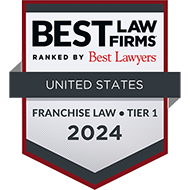Frequently Asked Questions About Franchise Law
1) What is franchising?
Franchising is a way for businesses to expand by offering independent franchisees the ability to use a business’s name, branding and method of operation. Franchising offers businesses the opportunity to increase their footprint, but it limits their control over individual franchise locations. Franchisors usually provide training to ensure that the method of operation is conveyed to employees, and franchisees usually pay the business owner an ongoing franchise fee as well as royalties.
Franchised businesses usually fall into one of three categories:
- Distributorships, where the franchisor licenses another person to sell the franchisor’s product exclusively.
- Business format franchises, where the franchisee operates a business under the franchisor’s trade name and is generally required to follow the franchisor’s standardized operating procedures.
- Manufacturing franchises, where the franchisor provides the franchisee with the ingredients or formula for a particular product that the franchisee will manufacture.
2) What kinds of businesses can be franchised?
Fast-food restaurants are common examples of franchises, but nearly any type of business can be franchised. Common types of businesses that are franchised include:
- Bakeries and restaurants
- Retail print shops
- Cleaning services
- Construction firms
- Hotels
- Pharmaceutical manufacturing companies
- Fitness centers and gyms
3) Who oversees franchising?
Franchising is regulated throughout the United States by the U.S. Federal Trade Commission (FTC), and that organization’s rule applies everywhere in the United States. State agencies also regulate franchising where relevant.
4) What is a franchise disclosure document (FDD)?
The franchise disclosure document (FDD) is a document that franchisors must provide to the prospective franchisee a minimum of 10 days before the franchise agreement is signed. Under Federal Trade Commission rules, it must include a listing of all current (and recently departed) franchisees and information about the operation of the franchise. FDDs also include information on litigation history, the franchisee’s initial investment, operating expenses, advertising and termination policies. The FDD provides franchisees with an opportunity to study the investment and evaluate the franchisor before buying.
5) What other kinds of agreements are commonly involved in franchising?
The foundation of a franchise is the franchise agreement (sometimes called a “license agreement”). This document lays out the relationship between franchisor and franchisee.
Additional documents may be required depending on the franchise in question. Collateral agreements may cover additional issues such as noncompetition, powers of attorney, collateral issues, software licensing and technology. Personal guarantees for the franchise’s performance may be required. Franchisees may also be required to enter into contracts with third parties such as specific landlords and vendors in order to do business.



